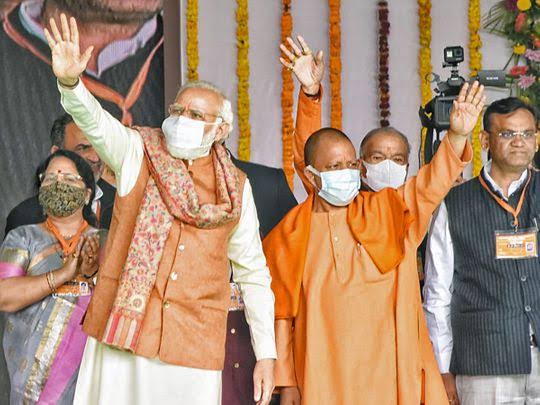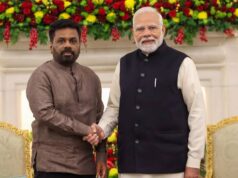UP remains central to BJP

In India, a Congress leader Rahul Gandhi tweeted a few days ago that assembly elections 2022 are an apt opportunity to defeat (politics of) hate.
Top opposition political leaders in the country — from Sharad Pawar to Mamata Banerjee are itching to make an impact in the upcoming Uttar Pradesh (UP) elections.
Most political pundits think that UP is the most crucial test before the 2024 general election and these polls will make or break BJP government’s future plans. This rhetoric can be heard in many places but in reality that may not be the case.
Prime Minister of India Shri Narendra Modi losing his support base in Gujarat (not UP) may destabilise him. However as a National ruling party , Winning UP is more important for BJP as party, but not personally for Narendra Modi .
Uttar Pradesh, Uttarakhand, Manipur, Goa and Punjab are scheduled to go to polls soon but most analysts give attention to UP because it has 80 Lok Sabha and 403 assembly seats with around 150 million voters.
There is a kind of consensus that if Bharatiya Janata Party (BJP) loses UP, the future course of Indian politics would change.
Some interesting ground realities and the state’s own history underscore its real political importance.
In terms of Lok Sabha representation, the next big state after Uttar Pradesh is Maharashtra with 48 seats but it doesn’t wield proportionate political influence, not even one fourth of influence of UP.
Geographically speaking, Maharashtra is bigger than UP but since the days of Nehru, only Uttar Pradesh has been politically pampered. It continues to remain so.
But UP’s current importance is reasserted because both the Rashtriya Swayamsevak Sangh (RSS) and BJP are currently dominating the national agenda. Their two planks of Hindi language and Hindu identity are interwoven in UP.
Political significance of UP
In the BJP era, UP will never lose importance because of its Lingua Franca – Hindi. BJP’s slogan Hindi, Hindu, Hindustan continues to be their fundamental belief and that makes UP – with its population of 240 million – crucial.
There is no way BJP will leave their faith in the Hindi language. If and when the UP state is split up, the various colloquial languages including Awadhi, Khadi boli, Bhojpuri will prevail, but even the new states will continue to remain important for BJP politics.
Secondly, and most crucially, the UP remains the ground zero of BJP’s politics because the party has embarked upon rewriting history. UP’s RSS and BJP leaders believe the idea of partition of India was nurtured in UP. Even after 75 years, the RSS family is unable to outgrow this part of Indian history.
One of the unforgettable events of UP for them is what happened between March-November 1946. The Gadhmukteshwar riots in Meerut district are never forgotten by Sangh leaders of UP. It has more or less shaped their politics.
One senior leader of BJP told me back in 2013, “We fight Samajwadi Party tooth and nail because the communal section of Congress exploited the socialists and Mulayam Singh Yadav to give birth to it. SP is the platform created by communal elements of UP.”
When Mamata Banerjee or Sharad Pawar, veterans of Indian opposition politics, talk of arriving on Battlefield UP, it is taken with pinch of salt because the unwritten rule is that people in UP require to be addressed in Hindi or in a language that is understood in its 97,941 politically-aware villages.
Congress’s Brahmnical politics of few decades after independence, Samajwadi Party’s Yadav-Muslim combination, Dalits revolutionary consolidation under BSP and BJP’s Hindu identity politics have been absorbed here at various times but for non-Hindi speaking leaders to capture UP’s 75 districts and 822 blocks with issues of their own is as difficult as Pinarayi Vijayan trying to capture Tamil votes speaking Malayalam.
Consolidating Hindu votes
Chief Minister Yogi Adityanath has tried to touch 60,000 gramsabhas (grass root level democratic institution in each village) in one stroke with the help of language of power and with the issue of ‘law and order’. He took up the law and order issue to hit rival Samajwadi Party and to consolidate Hindu votes. While wearing saffron clothes, he has used the agenda of khakhi for political gains.
In questionable ways, police encounters under his watch. The government claims 139 criminals have been killed. Assets worth Rs 1848 crores have been seized and 43294 criminals are facing cases under the Gangster Act. Most of them belongs to rival parties or anti-BJP forces. 1047 illegal weapon-making factories have been closed down. More than 19000 criminals have been externed from UP.
These figures are not just empty numbers. It’s the dividing line. Yogi has created a constituency for the BJP as its middle-class supporters are silently in support of these stern police actions. Those who have been victims of police excesses (that includes large number of minorities and SP and BSP leaders) are against it.
The then president Amit Shah had launched a plan in 2014, soon after capturing New Delhi to expand the party in coastal states of Tamil Nadu, Andhra Pradesh, Odisha, West Bengal, Telangana and Kerala, in addition to the north-eastern states. Except West Bengal and Assam no expansion plan is working well. Therefore UP continues to remain central to BJP’s survival.
Yogi’s report card of development is a mixed bag and there is visible anti-incumbency due to unemployment and inflation against sitting MLAs. Even the state BJP is not a cohesive unit. Yogi is not considered saravmanya neta (widely accepted leader).
People’s sufferings during Covid’s second surge also isn’t forgotten. Two months back the BJP leaders were nervous and had serious doubts whether Yogi’s leadership can lead to electoral success.
Until Prime Minister Modi came to Yogi’s rescue by imparting some weight to his continuation as CM, there were many aspirants within the BJP to displace Yogi.
Notwithstanding these serious weaknesses, the fundamental plank of the BJP in UP so far haven’t been countered strongly by the opposition.
Priyanka Gandhi Vadra’s energetic efforts will help her last longer on the scene but in this election, the counter political attack on Yogi’s actions have not been too decisive.
During these elections BJP’s identity politics is their only major plank. As a party leader in Lucknow put it aptly, “a low voter turn out, due to Covid protocols, is a bigger worry to us than Priyanka Gandhi Vadra.”
Source : Gulf News




